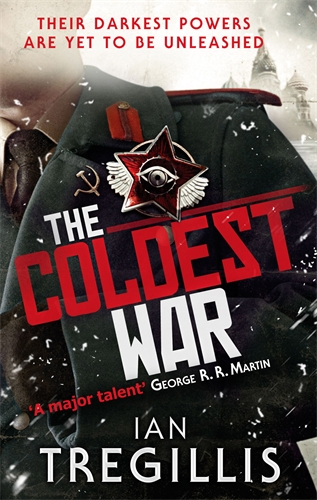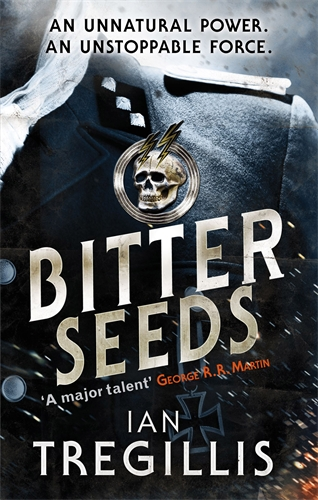Nuclear Deterrence in a Blood-Magic World
During our recent conversation about his Laundry novels, Charlie Stross mentioned he’d started out seeking to revitalize the horror behind Lovecraftiana by drawing a connection between unknowable dangers and the very familiar terror of the Cold War arms race. I found that particularly interesting. After all, the Laundry series and the Milkweed books share a subgenre that pits agents of the secret state against super- or paranormal entities. So perhaps it isn’t surprising that we’ve both recast the thermonuclear deterrence of Mutually Assured Destruction as something even more precarious: the threat of a mystical and far more absolute annihilation.
(We even followed parallel lines of thought when it came to titles. Charlie called his story of the Shoggoth Gap “A Colder War,” while I went with THE COLDEST WAR for my tale of mystical brinksmanship.)
even followed parallel lines of thought when it came to titles. Charlie called his story of the Shoggoth Gap “A Colder War,” while I went with THE COLDEST WAR for my tale of mystical brinksmanship.)
I was a child when the Reagan-era arms race began. But I had an early interest in science, so I’d already scoured the school library to read everything I could find about those wondrous things called atoms. Which unfortunately meant I had a vague notion of these things called atomic weapons. (Who in their right mind thought it was a good idea to let me read this stuff? Way to go, mom and dad.)
Thanks to classroom discussions of current events at the time, I also knew we were building them as fast as we could. Halfway around the world, so was another monolithic power. And we were aiming them at each other, like lions circling and snapping their teeth. But at that age I didn’t understand why this was happening, or why our enemies were so terrible that global annihilation was preferable to their triumph in some abstract and incomprehensible conflict. All I knew was the world teetered on a razor’s edge, and that my fate rested in the hands of people who knew nothing of me, my parents, or my cat (good old Gadzooks).
That’ll mess with your head when you’re 10 years old.
And so I spent the early 1980s filled with an almost paralyzing dread. I went to bed each night convinced – absolutely, unswervingly convinced – that death would come in the middle of the night. We’ve all seen film reels of atomic bomb tests: the flash; smoke billowing from the house as the paint vaporizes and the wooden frame smolders; the blast wave pulverizing the house into a billion flaming matchsticks . . . Many nights found me quietly crying in bed as that scenario played through my head on an endless loop. I pictured myself wandering a hellish landscape as a starving, parentless, catless wretch condemned to an agonizing death from radiation poisoning. (Unless the superintelligent cockroaches got me first.)
There’s a down side to having a vivid imagination. (But nowadays, when I look back on those years through the jaded eyes of an adult, I consider myself lucky. At least I didn’t experience the Cuban Missile Crisis. Now that was scary.)
 Such profound existential dread is a rich vein for speculative fiction. But in the altered history of the Milkweed novels, the Manhattan Project never happened. Instead the Second World War led the combatants to tinker with far more dangerous, far more destructive entities than the capricious genie of nuclear binding energy. Thus, in THE COLDEST WAR the deadlock doesn’t rely on thermonuclear deterrence. Instead it’s a standoff between twisted technology – the parascience of the Übermensch – and blood magic. What’s worse than nuclear Mutually Assured Destruction? What if one side has made a Faustian pact with malign, incomprehensible entities unbound by the laws of nature?
Such profound existential dread is a rich vein for speculative fiction. But in the altered history of the Milkweed novels, the Manhattan Project never happened. Instead the Second World War led the combatants to tinker with far more dangerous, far more destructive entities than the capricious genie of nuclear binding energy. Thus, in THE COLDEST WAR the deadlock doesn’t rely on thermonuclear deterrence. Instead it’s a standoff between twisted technology – the parascience of the Übermensch – and blood magic. What’s worse than nuclear Mutually Assured Destruction? What if one side has made a Faustian pact with malign, incomprehensible entities unbound by the laws of nature?
In communing with those demons, the Eidolons, Milkweed’s warlocks render the concept of a nuclear arsenal obsolete. In effect, the men who speak Enochian – the ancient, inhuman language of the Eidolons – are the atomic bombs of that world: they wield a barely restrained power with vast geopolitical influence. But so, too, do their post-war adversaries. For how do you fight an army of soldiers with the power to become invisible, to walk through walls, to fly, to fling fire with a single thought? What results is another precarious stalemate between snarling empires . . .
I would argue the mashup of “stale beer” Cold War espionage and blood magic is logical if not downright inevitable. They complement each other rather well. Consider this: what if George Smiley had contended with demons? I mean literal demons, supernatural entities, rather than the metaphorical demons of the political or ideological kind? The universe of John le Carré’s very fine novels can be a gray and murky place populated by characters who hold their motivations and machinations close to their chests. Wouldn’t the dubious morality of blood magic be right at home in that shadowy Cold War setting?
To my mind, this is precisely the kind of world that would contain warlocks: people capable of speaking to demons, whose esoteric knowledge is the most potent weapon in the world. So powerful, in fact, that a single slip or miscalculation could have catastrophic consequences for everybody – just as with the nuclear arms race.
